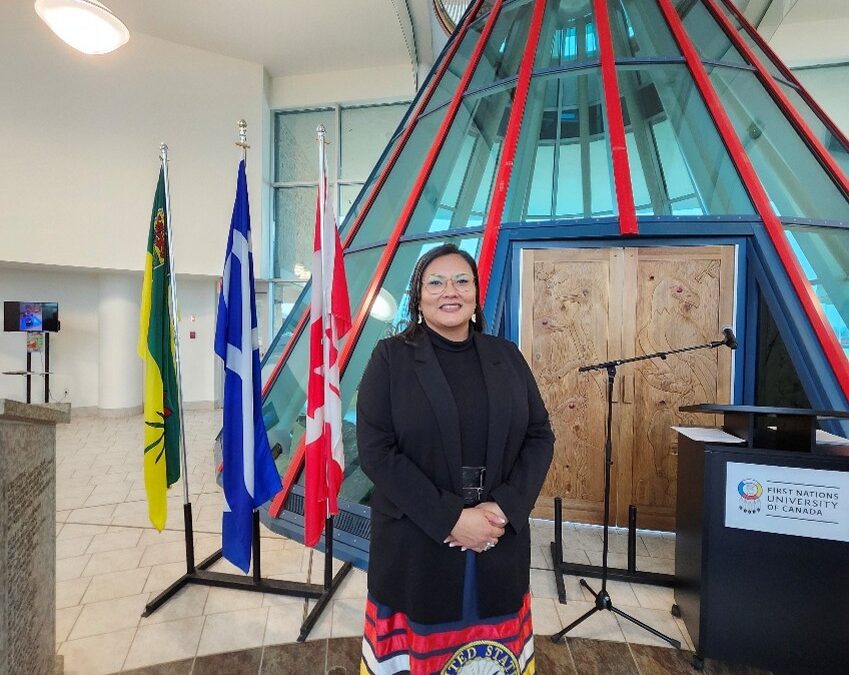Photo:Robin Cote at First Nations University of Canada Indigenous Veterans Day Event / Photo by Danielle Dufour
By Danielle Dufour
MBC News Freelance Correspondent
First Nations University of Canada
Robin Cote, who spoke at the Remembrance Day Service ceremony at the First Nations University of Canada this past Friday, is actively serving as a member of the Saskatchewan First Nations Veterans Association and advocates for veterans and youth in her community.
“I stand before you today as a First Nations soldier and an Indigenous woman who has earned the right to show up fully as herself inside and outside the uniform today,” said Cote.
Veteran Cote served in the United States Navy.
“On Remembrance Day and Indigenous Veterans Day, we honour the bravery and sacrifice and service of those who served before us and defend us,” said Cote.
She highlights the struggle many service members face when their military service ends, questioning their identity outside the uniform.
“For many service members, the hardest battle is the moment our service ends and when the unit is gone and the command is gone and you’re left asking, ‘Who am I?’” said Cote.
Cote has seen countless veterans struggle with that question and reflected on her grandfather’s experience as a First Nations soldier.
“I think about my grandfather’s, who never had to question who they were outside the uniform,” said Cote. “The military was something they did, but it was never all over.”
Cote noted that they maintained their cultural identity despite their military service and stressed the significance of Indigenous identity.
“They came home still rooted in land, language, kinship, ceremony, and nation identity,” said Cote. “That is the power of Indigenous identity.”
“We are more than the rules we serve; we are carried by something bigger,” said Cote.
Cote identified the importance of representation and visibility.
“As an Indigenous woman, I will never have to question who I am,” said Cote. “It is not just personal pride; that is intergenerational survival, that is sovereignty of spirit, because too often Indigenous veterans, especially Indigenous women veterans, are missing from the narrative.”
Cote discussed the lack of representation of Indigenous veterans, especially women, in the narrative of military service.
“We are rarely invited to the table, even though we bore the same wounds, bled the same blood, and defended the same land, sometimes before we even had the rights that the uniform promised us,” said Cote.
Cote mentions her efforts to create an event that will honour First Nations and indigenous veterans, emphasizing the need for their stories to be told by themselves.
“But today, let me say this clearly, First Nations women served, and we sacrificed that we deserve to be seen,” said Cote. “That is why I’m currently working to produce an event that will honour First Nations women veterans across our nations, because no one is going to tell our stories better than we would.”
Cote recounts a personal experience where she intervened when a police officer criticized a young boy for wearing a cowboy hat, highlighting the ongoing struggle for cultural expression.
“It wasn’t Halloween, and the officer told him he looked stupid,” said Cote. “I stepped in, and when I shared that I was military, suddenly I understood authority and conformity, but what I understood was this: policing and Indigenous boys’ clothing is not discipline; it is control.”
Cote expressed how it echoed a long history of telling Indigenous people what they can and cannot wear.
“Today we wear our ribbon skirts in schools because we fought for that,” said Cote. “We can speak our languages, dance our songs, and hold our ceremonies in public because veterans fought for that too.”
She connects the defence of Indigenous identity to the broader fight for cultural preservation.
“When we talk about service, we’re not just talking about war,” said Cote. “We’re talking about the defence of identity, the defence of culture, and the defence of future generations.”
The role of Indigenous veterans has shaped institutions, and Cote acknowledged the contributions of First Nations veterans in advocating for education, recognition, and sovereignty long before reconciliation became a government priority.
“Today I stand not just as a veteran but as a product of their vision, as living proof that we are still here, still serving, still standing, and still needing,” said Cote.
Cote emphasized the ongoing need for their legacy to be carried forward.
“I honour all who served but especially those who were never honoured properly,” said Cote. “To the women who wore the uniform without privilege, the grandfathers who fought for a country that did not fight for them, and too the youth still searching for who they are.”

Robin Cote at First Nations University of Canada Indigenous Veterans Day Event / Photo by Danielle Dufour
Cote concluded by emphasizing the importance of remembering and honouring the spirit of those who served, not just in their service but in their legacy.
“Let this day remind us we are not just in their service but their spirit, and we carry that legacy forward, not in silence but in mission, because we don’t just remember,” said Cote. “Lest we forget, and may we never again be forgotten.”
